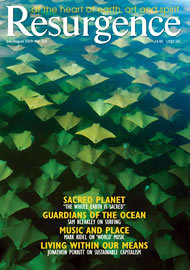In 2009, we seem to be at one of those infrequent economic tipping-points, also experienced in 1919, 1929, 1939 and 1989. Worryingly, even if understandably, disproportionate effort is being lavished on shoring up the dinosaurs of the old order, rather than investing in the new pioneers who are working hard to incubate and scale up market solutions essential for a sustainable future.
So where should we be investing? Let me draw on the conclusions of Volans’ latest study, The Phoenix Economy: 50 Pioneers in the Business of Social Innovation, exploring how leading social and environmental entrepreneurs, investors and businesses are thinking as the downturn evolves. Volans’ thinking has been guided by two very interesting economists, Nikolai Kondratiev and Joseph Schumpeter.
Kondratiev was shot on Stalin’s orders because he told the tyrant something he didn’t want to hear, let alone understand: In the early 1930s, with capitalism flat on its face, communists believed that the world was ripe for a new, socialist world order. Kondratiev thought differently, arguing that capitalism tended to re-invent itself in downturns, coming back stronger.
Kondratiev was imprisoned in 1932 and shot in 1938, but it takes more than a firing squad to kill a powerful new idea. His conclusion was that behind all the booms and busts, economic evolution proceeds in a series of long-running waves, fifty to sixty years from beginning to end. Schumpeter evolved the idea further, highlighting the periods of “creative destruction” that bring these great cycles to an end, preparing the ground for a new economic order.
Already, bad times have shaken confidence in old priorities. This has helped to create growing public and political appetite for an alternative paradigm, driven by more sustainable values and priorities. To date, however, most of the bail-outs have been driven by short-term panic rather than by any clear-sighted, long-term vision.
The discontinuity will drive radical economic clear-outs that open opportunities for entrepreneurial solutions to our growing challenges. Indeed, Van Jones of Green for All – one of the ‘Phoenix 50’ pioneers identified in the report – wrote to say that US$500 million had already gone into the US economic recovery bill for green jobs training. Good news, as far as it goes, but only the beginning of a transformation that will take decades to work.
Although blame is being heaped on the financial sector for its failures, we should look deeper for the true culprits. The root cause ultimately tracks back to a flawed mindset – part of our prevailing paradigm – that both permitted and drove high-risk appetites and behaviours with consequences far beyond the world’s financial system.
As James Lovelock noted at the launch of his new book, The Vanishing Face of Gaia, our ecological debt far outweighs our financial debt, and the ensuing ecological crunch will be severe in areas such as energy security, food, biodiversity, pandemic risks and climate instability, amongst others.
Unhappily, despite the potential of the discontinuity to drive desirable change, such periods also trigger economic nationalism, xenophobic sentiment, extremist politics and intergenerational tensions. In short, a positive outcome to our current crisis is by no means guaranteed, placing a premium on bold, far-sighted and effective leadership. So it should come as no surprise that the highest number of nominations from the innovators surveyed went to the Obama presidency. In terms of its values and ambitions, Team Obama has been part of the Phoenix Economy from the outset.
THE NEXT DECADE could see huge, positive, transformational change. The phoenix is a mythical bird symbolising longevity – sustainability – with a life expectancy of at least 500 years. At the end of its life cycle, it was consumed by flames, and a new bird rose from the ashes. Our Phoenix 50 pioneers range from tiny enterprises like APOPO International, which uses trained rats to sniff out buried land-mines; the Cleantech Group, which links sustainable technology innovators with venture capitalists and other funders; and the Marine Stewardship Council, now working with retailers like Wal-Mart to create demand for sustainable fish.
They range across the for-profit to not-for-profit spectrum, but all are determined not to waste the evolving crisis, whatever future historians end up calling this period of our history.







